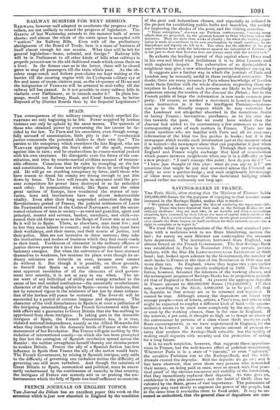FRENCH JOURNALS ON ENGLISH TOPICS.
Tim Journal des Debate has an excellent paper this week on the attention vihich is just now absorbed in England b,y the condition
of the poor and industrious classes, and especially as evinced in the project for establishing public baths and laundries, the society for improving the abodes of the poor, and the visiting societies.
"These enterprises," observes our Parisian contemporary, "among many others that are projected, do the greatest honour to those who have taken the initiative. They are more than works of charity ; for when the working popu- lation is made to contribute to its own amelioration by small sacrifices, its in- dependence and dignity are left to it. Too often has the schedule of the poor man's miseries been made the indictment against the favourites of Fortune : it is but just to show that Lazarus does not always meet with the wicked rich."
So exhorts the leading journal of that capital where Dives read in his own red blood what foolishness it is to drive Lazarus mad with neglected despair. The exhortation of so distinguished a neighbour may give a new stimulus to generous impulses among us.
It suggests also a further way in which the journals of Paris and London may be mutually useful in these reciprocal comments. No doubt, there are many persons in Paris whose knowledge of London made them familiar with the whole discussion respecting these en- terprises in London ; and such persons are likely to be peculiarly numerous among the readers of the Journal des Debals ; but to the French public at large the information is now made common pro- perty. Of course, so marked a movement in London must have some instruction in it for the intelligent Parisian,.—instruc- tion as to the friendly respect which he may entertain for the Londoner not altogether absorbed in the monstrous desire to betray France ; instruction, perchance, as to his own du- ties towards the poor. But we could have wished that the Journal had added to its commentary a few sentences as to the corresponding state of such matters in France. There are no doubt numbers who are familiar with Paris and all its customs; information of the kind too lies perdue in books ; but it is the newspaper which recalls such information just at the moment when it is wanted—the newspaper alone that can popularize it just when the public mind is open to receive it. Through their newspapers, England and France might exchange that kind of conversation which passes between neighbours when one is in a difficulty or has a new project : "I can't manage this point: how do you do it ? "— " I have just thought of this plan : what do you say to it ? " are questions that might be put and answered across the Channel as easily as over a garden-hedge; and such neighbourly interchange of ideas were surely better than the inebriated bullying which passed rather too commonly not long ago.


























 Previous page
Previous page